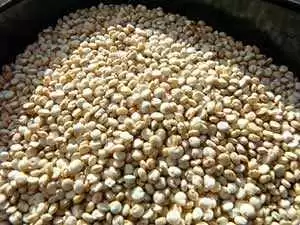Celiac.com 08/03/2012 - Quinoa is a highly nutritious grain from the Andes, with low concentrations of prolamins. Even though it is regularly recommended as part of a gluten-free diet, few studies have been done, and there is scant data to support this recommendation.
 A team of researchers recently evaluated quinoa together with millet, sorghum and wheat. The research team included Victor F. Zevallos, H. Julia Ellis, Tanja Šuligoj, L. Irene Herencia, and Paul J. Ciclitira. They are affiliated with the Division of Diabetes and Nutritional Sciences, Department of Gastroenterology at King's College London, United Kingdom, and the Departamento de Producción Vegetal at Universidad Politécnica de Madrid, in Spain.
A team of researchers recently evaluated quinoa together with millet, sorghum and wheat. The research team included Victor F. Zevallos, H. Julia Ellis, Tanja Šuligoj, L. Irene Herencia, and Paul J. Ciclitira. They are affiliated with the Division of Diabetes and Nutritional Sciences, Department of Gastroenterology at King's College London, United Kingdom, and the Departamento de Producción Vegetal at Universidad Politécnica de Madrid, in Spain.
Celiac.com Sponsor (A12):
The study was supported by the Food Standards Agency PG1017 of the Clinical Research Trust, and the European Commission QLK1-CT-2002-02077.
The team wanted to determine the amount of celiac-toxic prolamin epitopes in various quinoa strains from different regions of the Andes, along with the ability of these epitopes to trigger immune responses in patients with celiac disease.
For their test, the team used 15 cultivars of quinoa provided by Irene Herencia in coordination with the germoplasm bank at INIA Peru, millet and sorghum provided by F Janssen of the regional food inspection service in Zuppen, Netherlands, and peptic/tryptic digested wheat gliadin donated by Herbert Wieser German Institute for Food Chemistry in Garching, Germany.
They measured the concentration of celiac-toxic epitopes using murine monoclonal antibodies against gliadin and high-molecular-weight glutenin subunits.
To assess immune response, they conducted proliferation assays of celiac small intestinal T cells/interferon-γ (IFN-γ) and production of IFN-γ/IL-15 after organ culture of celiac duodenal biopsy samples.
Of the fifteen quinoa strains tested, the researchers found that four strains had measurable concentrations of celiac-toxic epitopes, but that these levels were below the maximum permitted for a gluten-free food.
Notably, the Ayacuchana and Pasankalla strains triggered T cells at levels similar to those for gliadin and caused secretion of cytokines from cultured biopsy samples at levels comparable with those for gliadin.
The end result was that most quinoa strains are safe for celiacs, and do not possess measurable amounts of celiac-toxic epitopes. However, 2 strains do contain celiac-toxic proteins that might trigger adverse immune responses in some patients with celiac disease.
Because so many people with celiac disease turn to quinoa as an important source of nutrients, more study is needed to determine if all strains are safe, or if certain strains need to be avoided.
Source:
- Open Original Shared Link








Recommended Comments